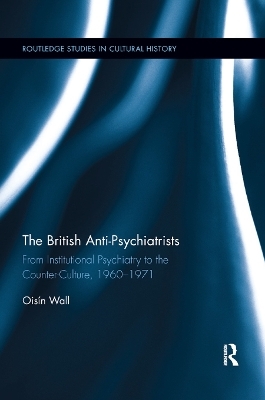
The British Anti-Psychiatrists
From Institutional Psychiatry to the Counter-Culture, 1960-1971
Seiten
2019
Routledge (Verlag)
978-0-367-88537-3 (ISBN)
Routledge (Verlag)
978-0-367-88537-3 (ISBN)
This book explores the work of the British anti-psychiatric group through its social and theoretical networks. It offers new readings of the group’s activities and writings by examining them as unfolding conversations, rather than focusing on any one writer. Through this exploration the book argues that the group’s synthesis of disparate discour
The British anti-psychiatric group, which formed around R.D. Laing, David Cooper, and Aaron Esterson in the 1960s, burned bright, but briefly, and has left a long legacy. This book follows their practical, social, and theoretical trajectory away from the structured world of institutional psychiatry and into the social chaos of the counter-culture. It explores the rapidly changing landscape of British psychiatry in the mid-Twentieth Century and the apparently structureless organisation of the part of the counter-culture that clustered around the anti-psychiatrists, including the informal power structures that it produced.
The book also problematizes this trajectory, examining how the anti-psychiatrists distanced themselves from institutional psychiatry while building links with some of the most important people in post-war psychiatry and psychoanalysis. The anti-psychiatrists bridged the gap between psychiatry and the counter-culture, and briefly became legitimate voices in both. Wall argues that their synthesis of disparate discourses was one of their strengths, but also contributed to the group’s collapse.
The British Anti-Psychiatrists offers original historical expositions of the Villa 21 experiment and the Anti-University. Finally, it proposes a new reading of anti-psychiatric theory, displacing Laing from his central position and looking at their work as an unfolding conversation within a social network.
The British anti-psychiatric group, which formed around R.D. Laing, David Cooper, and Aaron Esterson in the 1960s, burned bright, but briefly, and has left a long legacy. This book follows their practical, social, and theoretical trajectory away from the structured world of institutional psychiatry and into the social chaos of the counter-culture. It explores the rapidly changing landscape of British psychiatry in the mid-Twentieth Century and the apparently structureless organisation of the part of the counter-culture that clustered around the anti-psychiatrists, including the informal power structures that it produced.
The book also problematizes this trajectory, examining how the anti-psychiatrists distanced themselves from institutional psychiatry while building links with some of the most important people in post-war psychiatry and psychoanalysis. The anti-psychiatrists bridged the gap between psychiatry and the counter-culture, and briefly became legitimate voices in both. Wall argues that their synthesis of disparate discourses was one of their strengths, but also contributed to the group’s collapse.
The British Anti-Psychiatrists offers original historical expositions of the Villa 21 experiment and the Anti-University. Finally, it proposes a new reading of anti-psychiatric theory, displacing Laing from his central position and looking at their work as an unfolding conversation within a social network.
Oisín Wall is the Research Curator of the Medicine Galleries at the Science Museum, London.
1. Introduction: "A Vista of Broken Clocks" 2. "Psychiatry’s Third Revolution": The Therapeutic Community, Community Care, And Deinstitutionalisation 3. The Anti-Hospital and the Therapeutic Community: Two Anti-Psychiatric Communities 4. "With Co-Operation We Could All Actually Win’: Three Anti-Psychiatric Events 5. "Society is a Concentration Camp": Existential Reality and Liberation 6. "A Depersonalized, Dehumanized World": The Politics of the Family 7. Conclusion
| Erscheinungsdatum | 24.12.2019 |
|---|---|
| Reihe/Serie | Routledge Studies in Cultural History |
| Verlagsort | London |
| Sprache | englisch |
| Maße | 152 x 229 mm |
| Gewicht | 322 g |
| Themenwelt | Geschichte ► Teilgebiete der Geschichte ► Kulturgeschichte |
| Studium ► Querschnittsbereiche ► Geschichte / Ethik der Medizin | |
| ISBN-10 | 0-367-88537-9 / 0367885379 |
| ISBN-13 | 978-0-367-88537-3 / 9780367885373 |
| Zustand | Neuware |
| Informationen gemäß Produktsicherheitsverordnung (GPSR) | |
| Haben Sie eine Frage zum Produkt? |
Mehr entdecken
aus dem Bereich
aus dem Bereich
der stille Abschied vom bäuerlichen Leben in Deutschland
Buch | Hardcover (2023)
C.H.Beck (Verlag)
23,00 €
vom Mittelalter bis zur Gegenwart
Buch | Softcover (2024)
C.H.Beck (Verlag)
12,00 €


